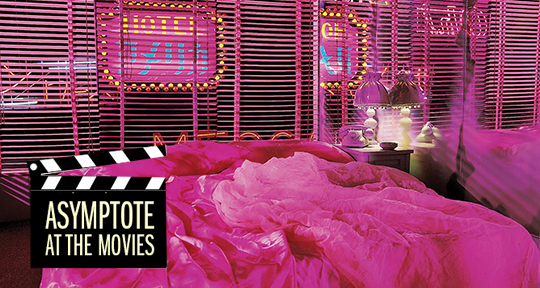Despite a good deal of justifiable hysteria concerning the survival of print literature in the age of online publishing, new media, and a ruthless attention economy, it seems that the words of Umberto Eco have proven to be withstanding: the book will never die. The text has only become more malleable and diverse as new platforms are granted to it; literature’s performance is the same as that of a drop of paint in a glass of water—the entirety is invariably adopted into its presence. As devotees of the book, however, we at Asymptote found ourselves engaged by the artform that seems to lend itself particularly to the cooperation with literature: film. So, we present the debut of Asymptote at the Movies, in which we discuss cinematic adaptations of our favourite translated works and authors from the lens of readers, to discern and investigate that other enigmatic process of translation, that from the text to the screen.
Our first film is Paul Schrader’s masterful Mishima: A Life in Four Chapters, an uncompromising and transcendent film that ideates scenes from the Japanese author’s life in juxtaposition to three of his novels: The Temple of the Golden Pavilion, Kyoko’s House, and Runaway Horses. Below, the blog editors talk about Yukio Mishima’s authorial presence in cinema, the literality of images, and the sensuality and emotionality of film’s structural elements.
Xiao Yue Shan (XYS): In a 1966 interview, Yukio Mishima quotes the pivotal line from Hagakure, the spiritual guide for samurai: “The way of the samurai is found in death.” He committed suicide four years later, after a lifetime under its fantastic thrall, leaving behind a legacy of language that dreamed in equal ecstasy of death; as a longtime reader of his work, I’m convinced that he intended his existence to be triumphantly underscored by this violent and dramatic end, and Paul Schrader evidently feels the same way. Of the many axioms that Mishima lived and wrote—beauty, purity, honour, truth—Schrader situates the author’s inveterate obsession with death as the ancestor of his work and life, and the suicide as the culmination of a lifetime of justification. So it is that he combines scenes from three of Mishima’s novels that delves most deeply into the psychology of devoted self-obliteration. I’d like to start by talking broadly about this film’s narrative, and as to what you both thought of the director’s Pirandellian choice, to render the author indistinguishable from his characters within such a fluid account, in which the fiction bleeds seamlessly into vérité.

